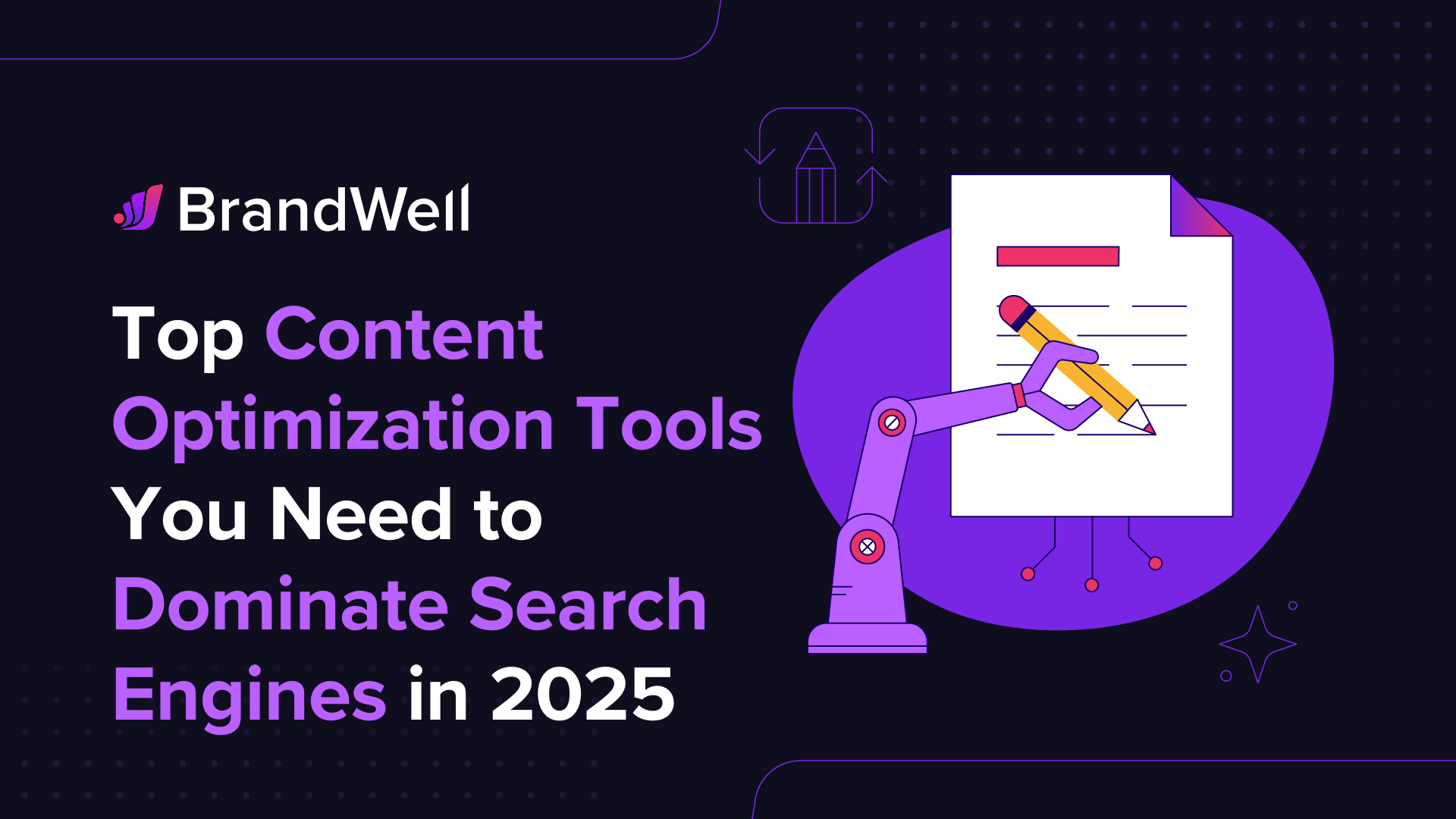As a former agency owner, writer, and mentor, I’ve spent more than a decade helping businesses craft compelling content that resonates with their target audience. But I’ve also seen firsthand how difficult it can be to optimize that content for maximum impact.
I’ve been there, done that, and got the t-shirt — struggling to keep up with the latest SEO trends, pouring over analytics reports, and trying to decipher what’s working and what’s not.
That’s why I’m excited to share my insights on content optimization tools, and how they can revolutionize the way you approach content creation.
In this post, we’ll dive into the world of content optimization, exploring what these tools are, and how to use them to supercharge your content.
Plus, I’ll let you in on a little secret: I’ve found an all-in-one solution that’s changed the game for me, and I think it will for you too — BrandWell.
Stay tuned to learn more about this powerful tool and how it can help you elevate your content to new heights.
Table Of Contents:
- What is a Content Optimization Tool?
- Best Content Optimization Tools for 2025
- Should You Use a Content Optimization Tool?
- FAQs: Content Optimization Tool
- Conclusion
What is a Content Optimization Tool?
A content optimization tool is a software solution that helps improve the quality and performance of content by analyzing and providing recommendations on various aspects such as readability, SEO, tone, and engagement.
Why do you need a content optimization tool?
Your client may have the most amazing product or service, but if their content isn’t optimized, no one will find it. As their partner agency, you want to help them achieve their business goals by creating content that appeals to both readers and search engines. This is where a content optimization tool can help.
These tools use natural language processing (NLP) to help you create content briefs, conduct keyword research, and optimize your content for readers and search engines. Some even include AI writing features.
Content optimization software solutions are powered by algorithms that understand how Google “thinks,” highlighting keyword opportunities, suggesting relevant questions to answer, and even assessing your content’s readability.
What can a content optimization tool do for you?
Keyword Research
One of the most crucial steps of content optimization is keyword research. A tool like BrandWell, Ahrefs, or Semrush can help you find relevant and profitable keywords and phrases that you can build your content around.
Here’s an example of a keyword report from BrandWell:
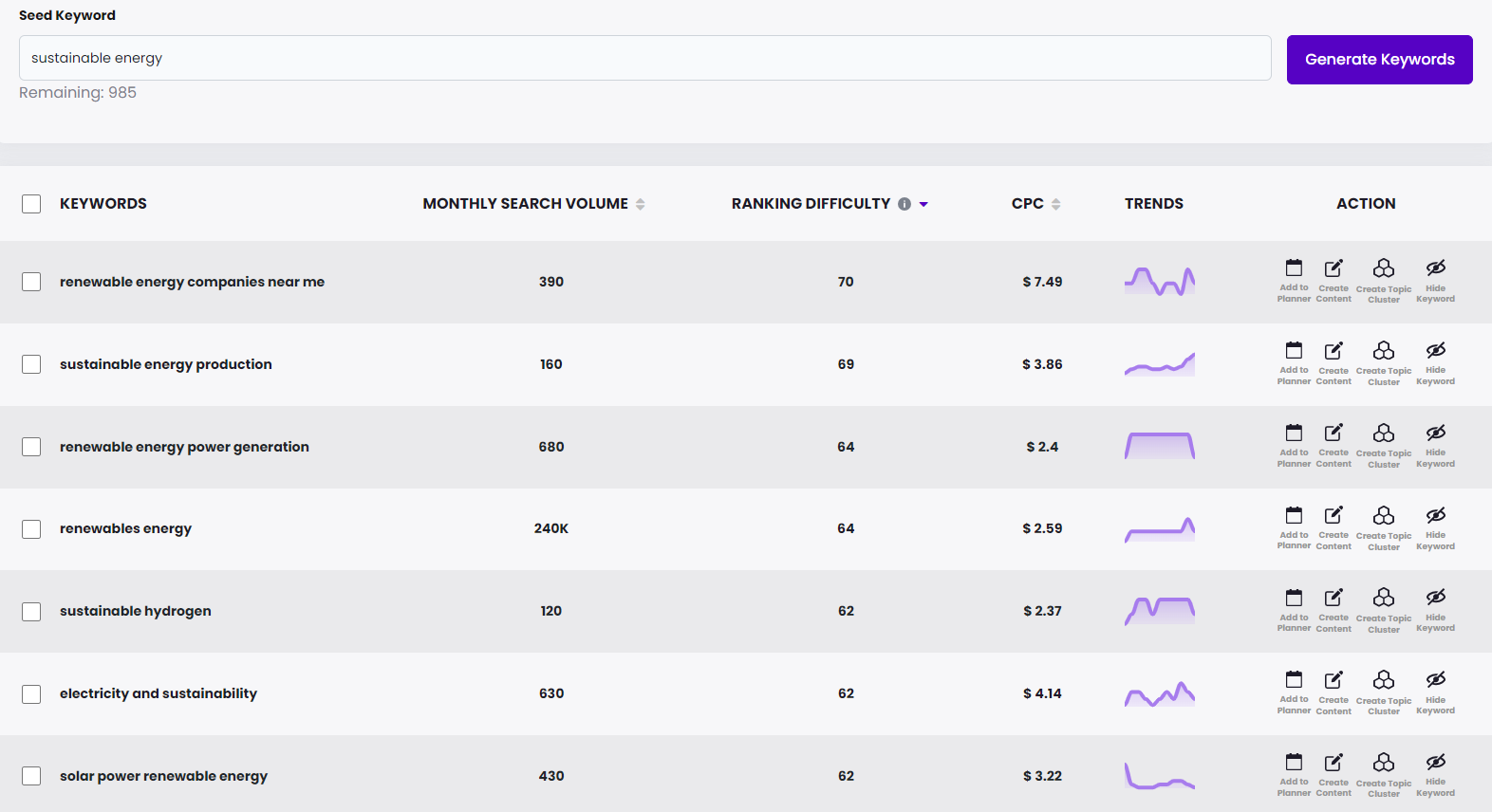
When choosing primary and secondary keywords, consider factors like search volume and keyword difficulty but also dig deep to understand search intent.
You can also use a content optimization tool to analyze competitors’ content and find gaps and keyword opportunities.
Outline Building
From your keyword research, build a logical blog outline that addresses user questions and pain points through clear headings, subheadings, and topic sections. This will help you create content that is both informative and engaging.
BrandWell does this for you automatically so you don’t have to start from scratch. Just enter your primary keyword and the app will build a comprehensive outline that includes a title, introduction, table of contents, H2-H5 headers, bullet points or numbered lists, and a conclusion to wrap up your topic.
You can even modify this blog outline if your client has submitted their preferred structure.
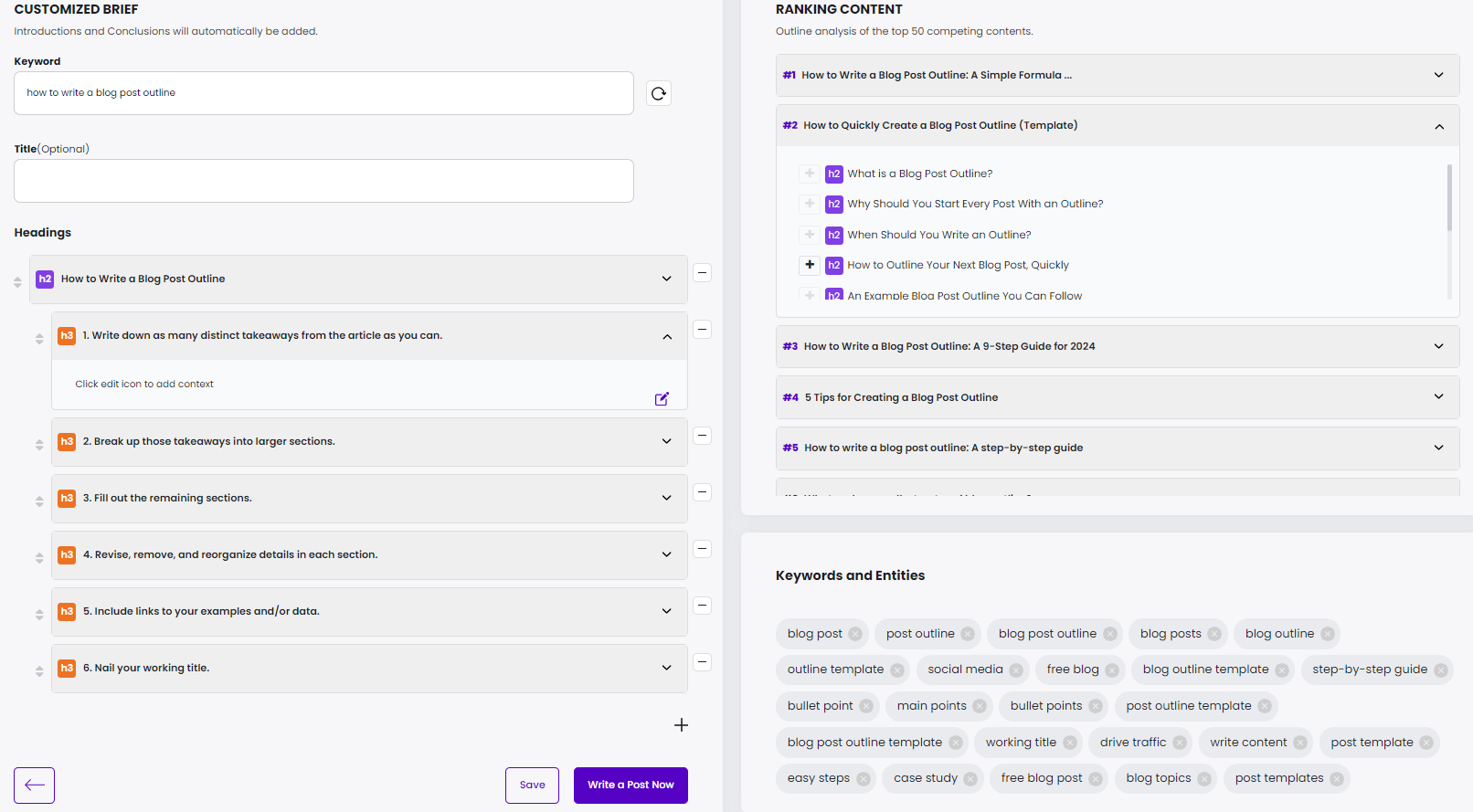
Content Creation
As I mentioned earlier, some content optimization tools offer AI writing features. Thanks to artificial intelligence, content creation is now easier than ever.
BrandWell is one of the few tools that can do both content optimization and content creation. By simply entering a long-tail keyword, you can create high-quality, informative content that is enjoyable to read. You can choose a tone of voice from 13 default options or even train the app in your writing style! For most blog posts, I recommend using a conversational tone unless you’re speaking to an audience in a highly technical niche like lawyers or scientists.
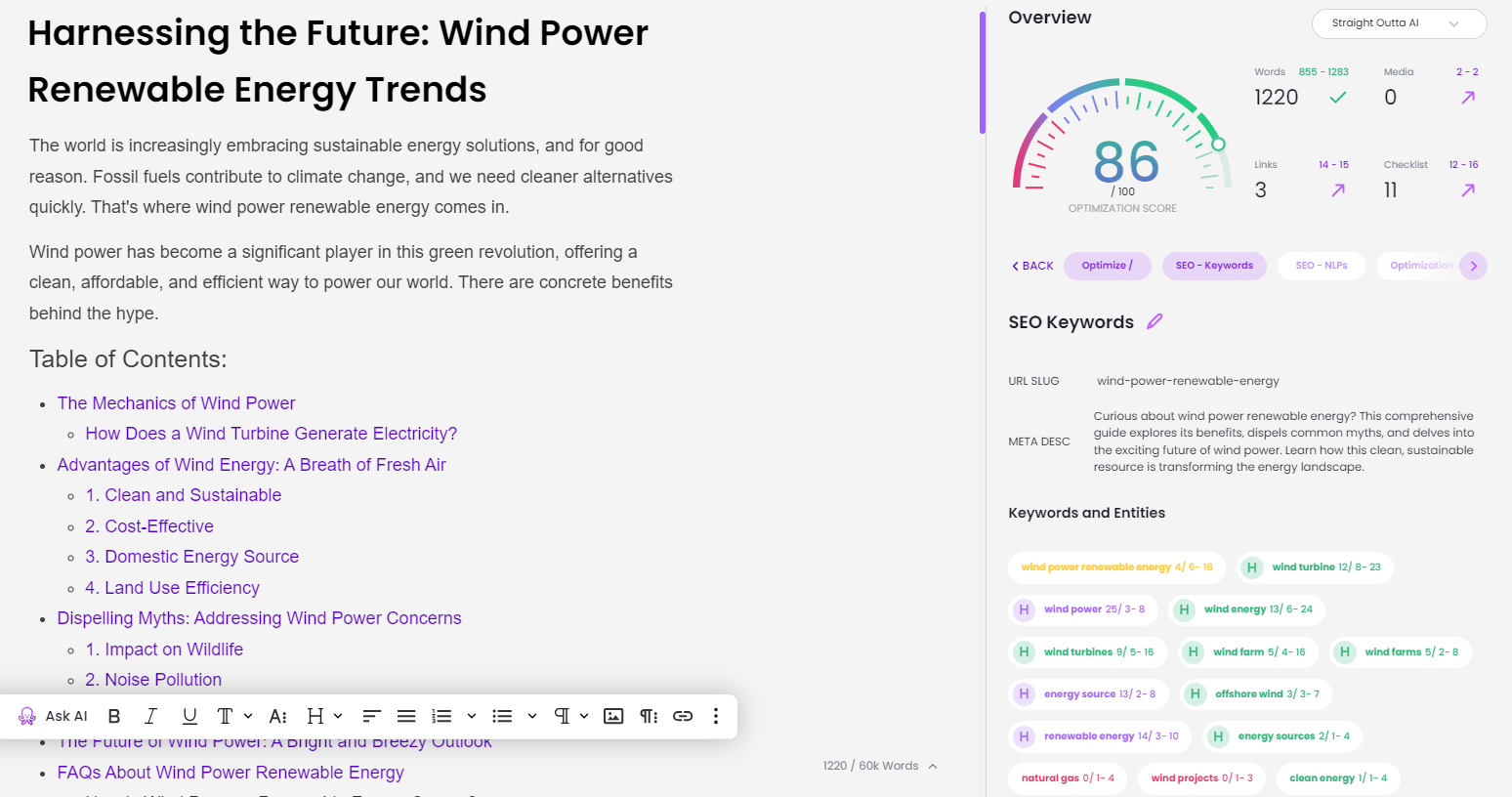
Make sure to use a variety of content formats, such as text, images, and videos, to keep your readers engaged.
On-Page Optimization
SEO specialists are adept at on-page optimization. But if you’re a one-person agency and you don’t have the budget to hire outside help, a content optimization tool can be highly beneficial for this process.
If you’re already using BrandWell to create content, you don’t have to worry about on-page optimization because it’s baked right in. BrandWell automatically adds your target keywords strategically within your content (naturally, of course) so that search engines will understand what your article is all about and how it should be ranked.
BrandWell also allows you to run an optimization audit right inside the app, in real time, so you can get valuable insights on how to improve your content’s visibility.
Here’s an example of a content audit report generated by BrandWell:
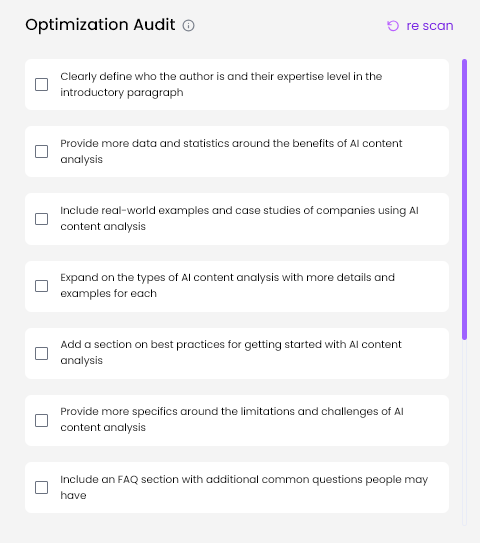
Link Building
A crucial part of SEO is earning backlinks from reputable sites in your niche. These are like “votes” for your content and show Google you’re trustworthy.
Link building can be time-consuming, not to mention expensive. If you’re hiring a link-building service, that can quickly drain your budget. This is where BrandWell truly stands out. It’s the only content optimization tool that gets you backlinks from real brands in your client’s niche!
Watch this video to see how our Brand Publisher Network works:
To demonstrate how content optimization tools can truly help your agency, let me share with you a few other options that you might find useful for your business.
Best Content Optimization Tools for 2025
Remember that tools are meant to help you streamline processes, not do the work for you. The best content optimization tool for your agency will depend on your specific needs and budget.
1. Clearscope
Clearscope makes creating high-quality content easy. Whether you need to do a quick keyword research, build a content brief, analyze competitors, or even need citations, this is an excellent choice. The integration with platforms like Google Docs and WordPress makes it convenient when you’re ready to publish.
One of Clearscope’s standout features is its Content Report. By inputting your target keyword, you receive a comprehensive analysis that includes:
- Content Grade: Get an instant assessment of how well your content is optimized for your chosen keyword.
- Relevant Terms: Discover related keywords and phrases to incorporate naturally into your content, boosting its relevance and visibility.
- Competitor Analysis: See what’s working for your competitors and identify opportunities to differentiate your content.
- Readability Score: Ensure your content is clear, concise, and easy for your target audience to understand.
With keyword recommendations and content grading, Clearscope helps users create articles that are not only well-written but also tailored to rank higher on search engines. The platform is user-friendly, and the way it highlights essential keywords makes it simple to align your content with what’s working for competitors.
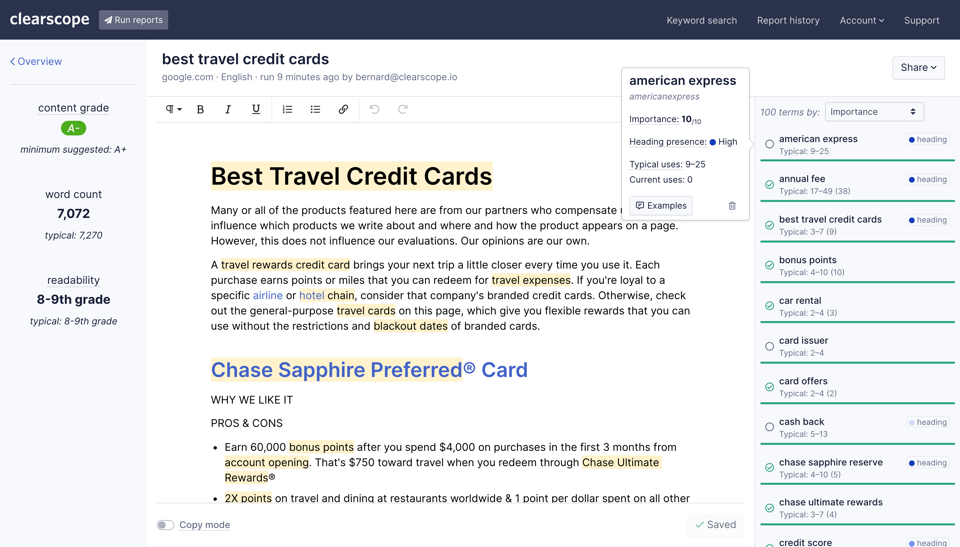
But Clearscope’s capabilities extend beyond individual content reports. It seamlessly integrates with your existing workflow, offering browser extensions for Chrome and Microsoft Edge. This allows you to access Clearscope’s insights directly within your Google Docs or WordPress editor, streamlining the optimization process.
That said, there are a few downsides. Clearscope’s pricing starts at $189/month which could be a drawback for smaller agencies. It also focuses heavily on content optimization, so if you’re looking for a tool that offers deeper insights into other aspects of SEO — like backlinking or technical audits — you’ll need to use it alongside other platforms.
If your main goal is to simply improve content performance, Clearscope is a great investment. Just be prepared to pair it with additional tools for a more complete SEO strategy.
2. MarketMuse
MarketMuse stands out for its in-depth approach to content planning and research. It can analyze a topic comprehensively and offer suggestions not just for keywords but also for subtopics and related areas you might overlook. This makes it incredibly useful for creating long-form content or a series of related articles.
MarketMuse is especially helpful for content teams looking to establish topical authority for their clients. The platform’s AI-driven insights help guide users in creating more thorough, relevant content that aligns with search intent.
Think of it as having an expert content strategist on your team, guiding your content planning and creation process with features like:
- Content Clusters: Discover clusters of related keywords and topics to build a comprehensive content strategy that ranks for a wider range of relevant searches.
- Content Brief Generator: Say goodbye to writer’s block! MarketMuse generates detailed content briefs with target keywords, suggested word count, questions to answer, and even competitor analysis.
- Keyword Research: Uncover valuable, high-impact keywords that go beyond simple search volume and consider search intent and competitive difficulty.
- Competitive Content Analysis: See exactly what your competitors are doing, identify content gaps, and discover opportunities to outrank them in the search results.
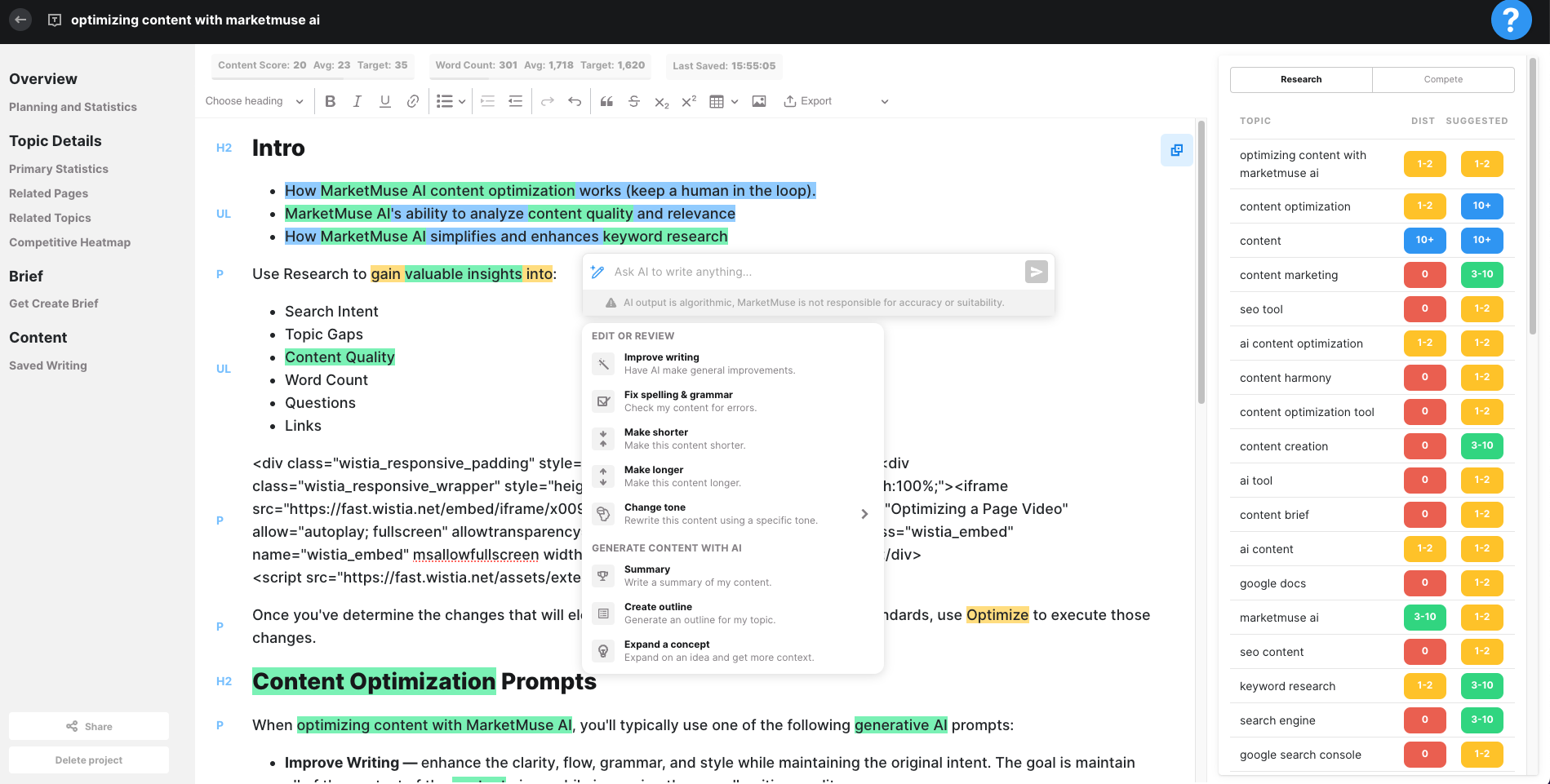
However, MarketMuse does have a steeper learning curve than most tools, which can be a bit overwhelming for those new to content optimization.
Its pricing can also be a sticking point — MarketMuse is positioned more for larger teams and agencies, which may put it out of reach for smaller businesses or solopreneurs.
Overall, MarketMuse is a powerful tool for those who need more strategic content guidance, but it’s not the easiest or most affordable option for everyone.
3. Semrush
Semrush stands tall in the world of SEO tools, and for good reason. Many businesses use it for keyword research, local SEO, social media marketing, backlink analysis, and more. One relatively unknown feature that Semrush excels at is content optimization.
With its SEO writing assistant, you can paste in your content and specify the keywords you want to target and it will provide you with immediate optimization feedback. The app will analyze and grade your content based on readability, originality, tone, and SEO strength.
From there, Semrush gives you actionable recommendations to improve your content. For example, it might tell you to:
- Add specific keywords that you’re targeting.
- Shorten sentences that are difficult to read.
- Adjust your tone to better match your intended audience.
The content analyzer tool also tells you how your content stacks up against competitors. The ability to track your rankings over time and see how your content performs in search results is invaluable for making informed decisions.
Like MarketMuse, Semrush can feel a bit overwhelming due to its extensive feature set, which might make it challenging for beginners to navigate. And while the pricing reflects its extensive capabilities, it may not be the most budget-friendly option for agencies looking to keep it tight.
4. NeuronWriter
NeuronWriter goes beyond basic grammar and spelling checks. This content optimization tool uses NLP to analyze your content alongside the top-ranking pages for your target keywords, identifying opportunities to enhance relevance and search engine ranking.
After trying NeuronWriter for content optimization, I’ve found it to be a surprisingly effective tool, especially for its price point. One of its key strengths is how easy it is to use — the interface is straightforward, and it doesn’t take long to get up to speed.
I also appreciate how it outlines competitor analysis, giving insights into what top-ranking pages are doing right, which is great for improving your own content.
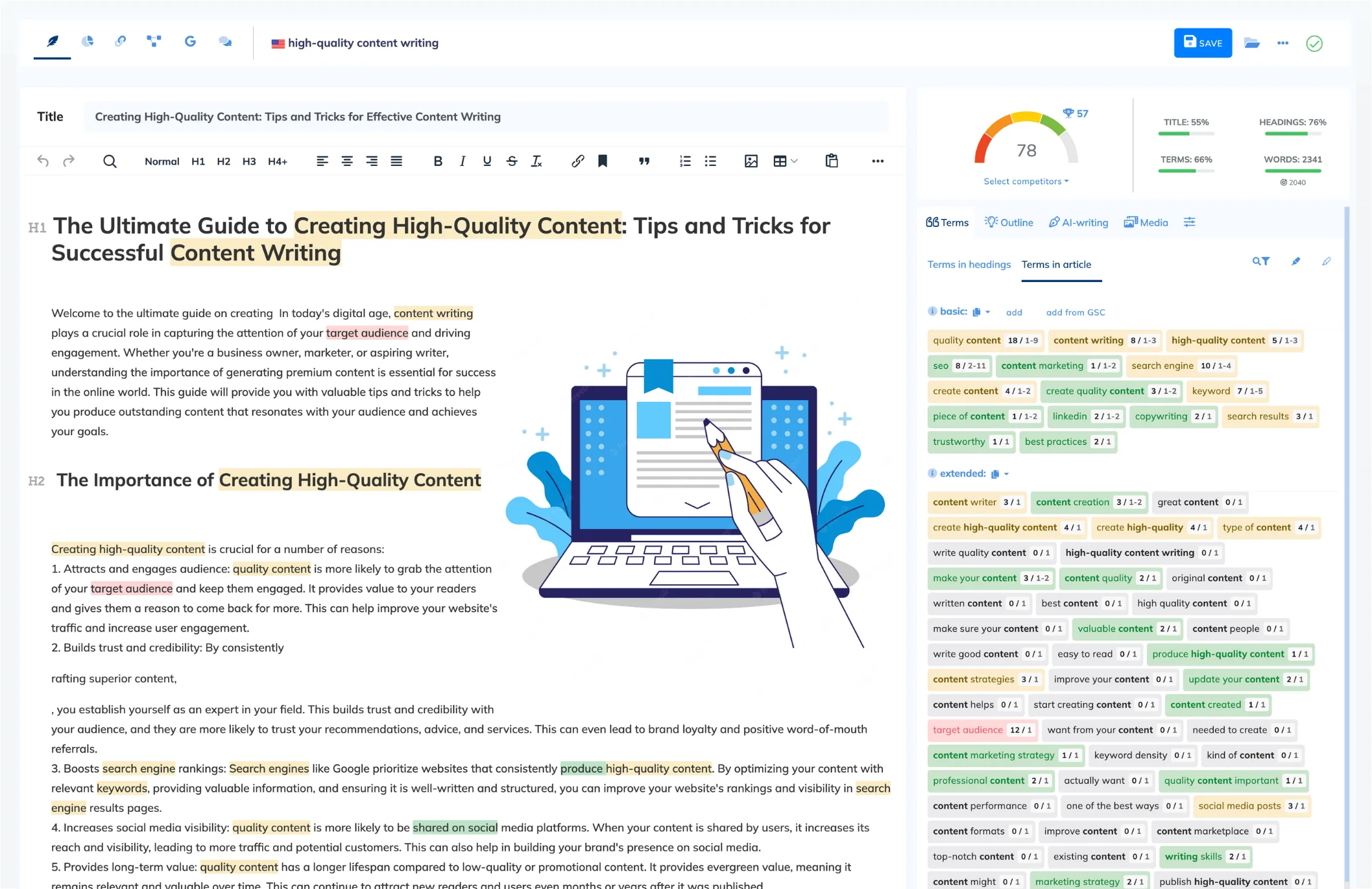
But similar to Clearscope, NeuronWriter’s features aren’t as in-depth or advanced as the more popular tools. If you’re looking for in-depth analytics or more comprehensive SEO features, you might feel like you need to supplement it with another tool.
Also, while it’s great for optimizing individual pieces of content, it doesn’t offer as much strategic guidance for larger content plans.
If you’re after an affordable, easy-to-use content optimization tool that covers the basics well, NeuronWriter is definitely worth considering. Just keep in mind it may not meet all your needs if you’re looking for more advanced functionality.
5. Dashword
Dashword’s strength lies in its ability to provide actionable, data-driven insights that can help you improve your content’s performance. The platform’s content analysis tool is incredibly thorough, offering suggestions on everything from sentence structure to keyword density.
I was impressed by how accurately it identified areas for improvement in my writing, and the recommendations were always spot on.
I also appreciate how user-friendly the interface is. Even as a non-techie, I found it easy to navigate and understand the various features and reports. Plus, the customer support team is super responsive and helpful.
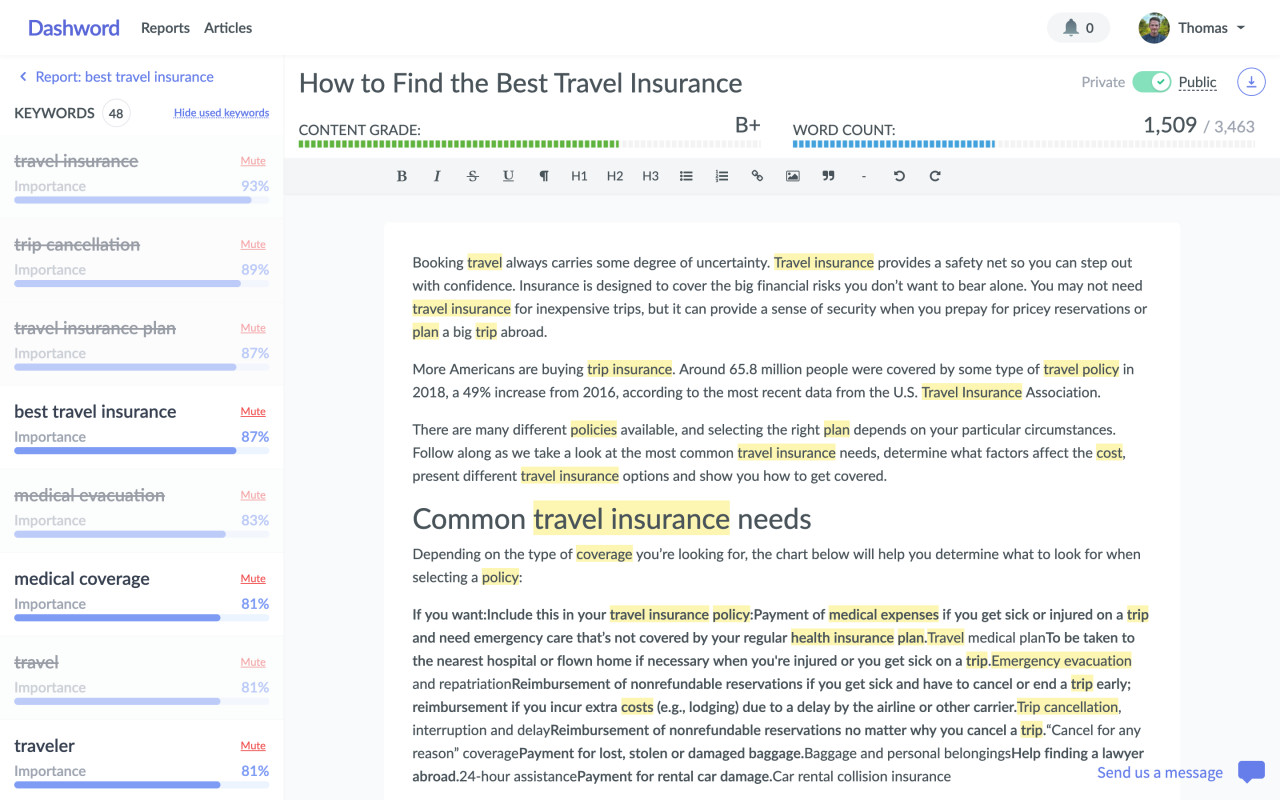
However, if I’m being honest, Dashword’s reporting can be a bit overwhelming at times. There’s so much data and analysis presented that it can be hard to know where to focus your efforts. I’d love to see more prioritization or filtering options to help users zero in on the most critical areas for improvement.
And while Dashword does offer some basic SEO tools, I don’t think it’s a replacement for a dedicated SEO platform. If you’re looking for advanced keyword research or backlink analysis, you might need to supplement it with another tool.
6. Outranking
Outranking is an AI-powered SEO content optimization platform that helps agencies and marketers conduct comprehensive keyword research, build data-driven content outlines, and produce high-quality content optimized for search engine rankings.
I’ve found Outranking to be an incredibly versatile tool, especially for planning and executing long-form content. One of its key strengths is how well it integrates AI-driven insights to guide content creation from start to finish.
The detailed outlines it generates save a lot of time, offering suggestions on key topics, subtopics, and keywords to include. It also provides real-time scoring to help you optimize as you write, making it easy to stay on track with SEO best practices.
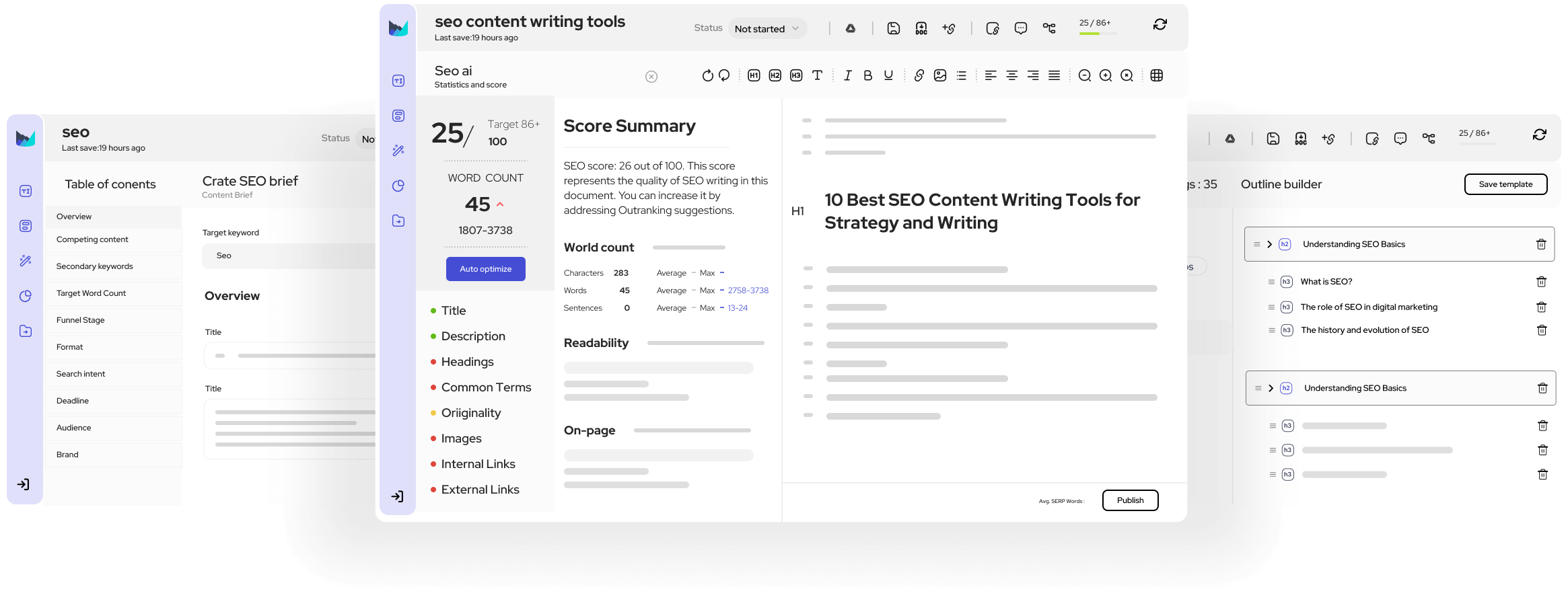
But while Outranking is packed with features, the interface can feel a bit cluttered, particularly for new users. It offers a lot of data but it might take some time to get comfortable navigating everything.
7. Yoast
Before there were AI content optimization tools, there was Yoast. This OG tool has long been a favorite for optimizing blog posts and web copy directly within WordPress. While not a full-fledged content optimization platform like BrandWell, Yoast is a great tool for optimizing for a specific keyword or phrase by analyzing elements like:
- Title tag and meta description length
- Keyword density
- Outbound and internal link count
- Content length and readability score
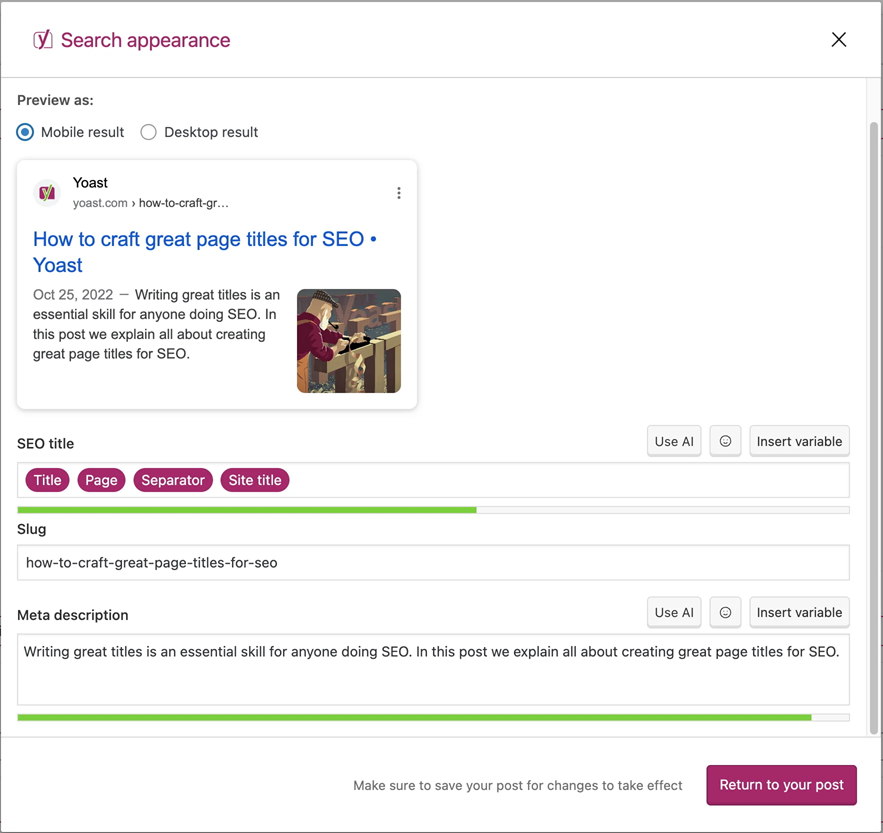
While it’s important not to get too hung up on achieving a “green score” in Yoast, the tool does a great job of providing a framework to make your content more Google-friendly.
8. GrowthBar
GrowthBar is another all-in-one SEO tool that allows you to perform keyword research, track rankings, and conduct competitor analysis. GrowthBar simplifies the content creation process with its AI content generator, which can create blog outlines, generate content, and optimize it for search engines.
This content optimization tool also provides you with valuable metrics like domain authority, backlinks, and organic traffic for any website. You can use these insights to inform your content strategy and improve your chances of ranking higher on search engine results pages (SERPs).
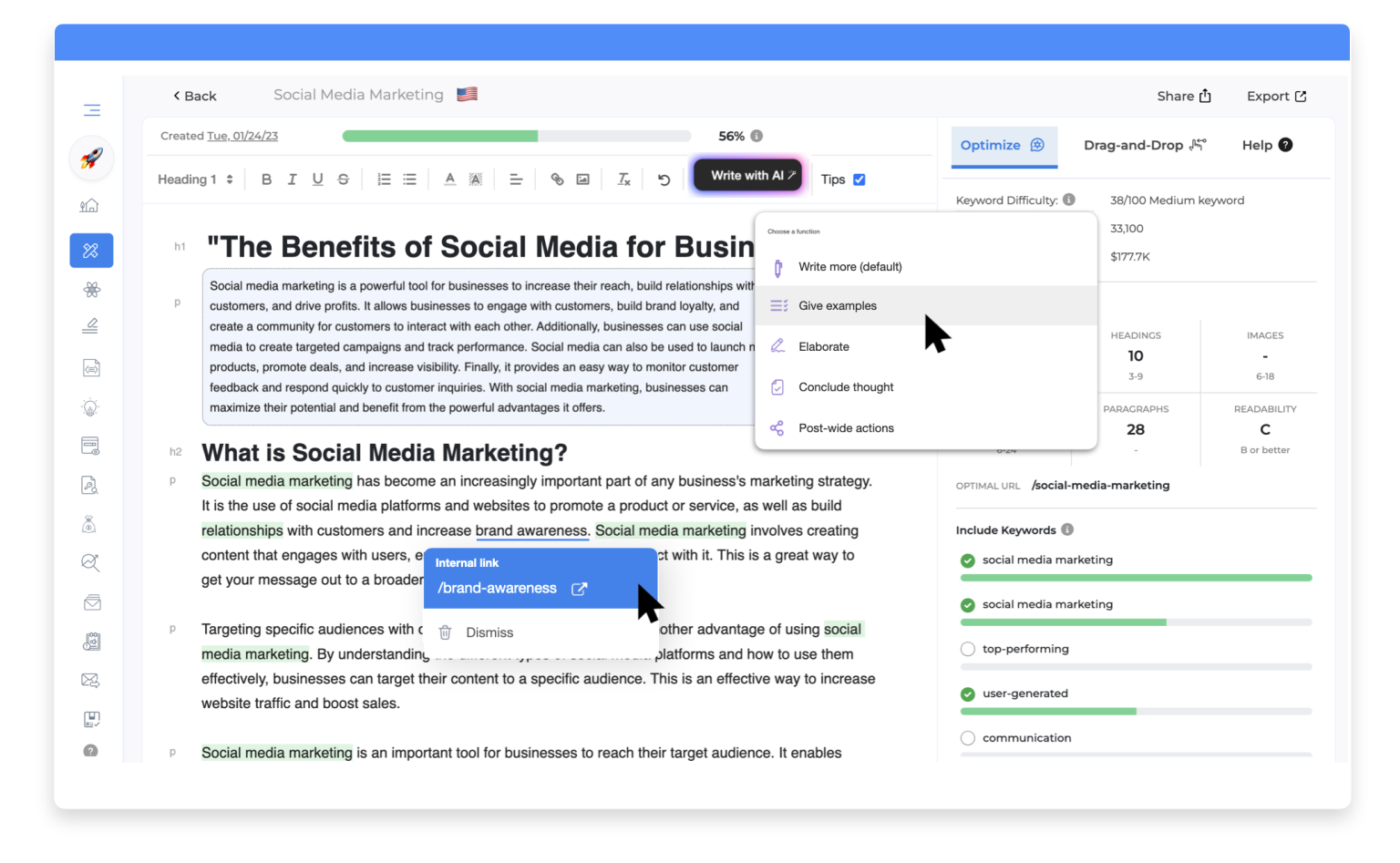
GrowthBar’s content analysis capabilities are impressive. It provides a detailed breakdown of your content’s strengths and weaknesses, giving you actionable insights to improve your rankings.
Navigation is a breeze, even for a non-techie like me. The dashboard is intuitive, and the features are well-organized.
While the basic plan is affordable, it’s a bit limited. You’ll need to upgrade to access more advanced features, which can add up. I’ve also experienced a few minor technical issues, but they were resolved quickly.
9. InLinks
InLinks is a powerful content optimization platform that leverages the power of entity SEO to help you create high-ranking content. What sets InLinks apart is its sophisticated approach to understanding your content’s context and relevance.
Unlike traditional SEO tools that focus on keywords alone, InLinks utilizes a semantic analysis approach. This means it goes deeper into the meaning behind words and phrases, identifying entities and relationships to provide you with actionable insights for optimization.
InLinks analyzes your content and compares it to top-ranking pages, giving you a clear understanding of what Google expects to see in high-quality content for your target topic. This allows you to:
- Discover relevant entities and keywords to include in your content.
- Identify content gaps and opportunities to outperform your competitors.
- Optimize your content structure and headings for better readability and search engine visibility.
- Ensure your content aligns with user intent and provides a comprehensive answer to search queries.
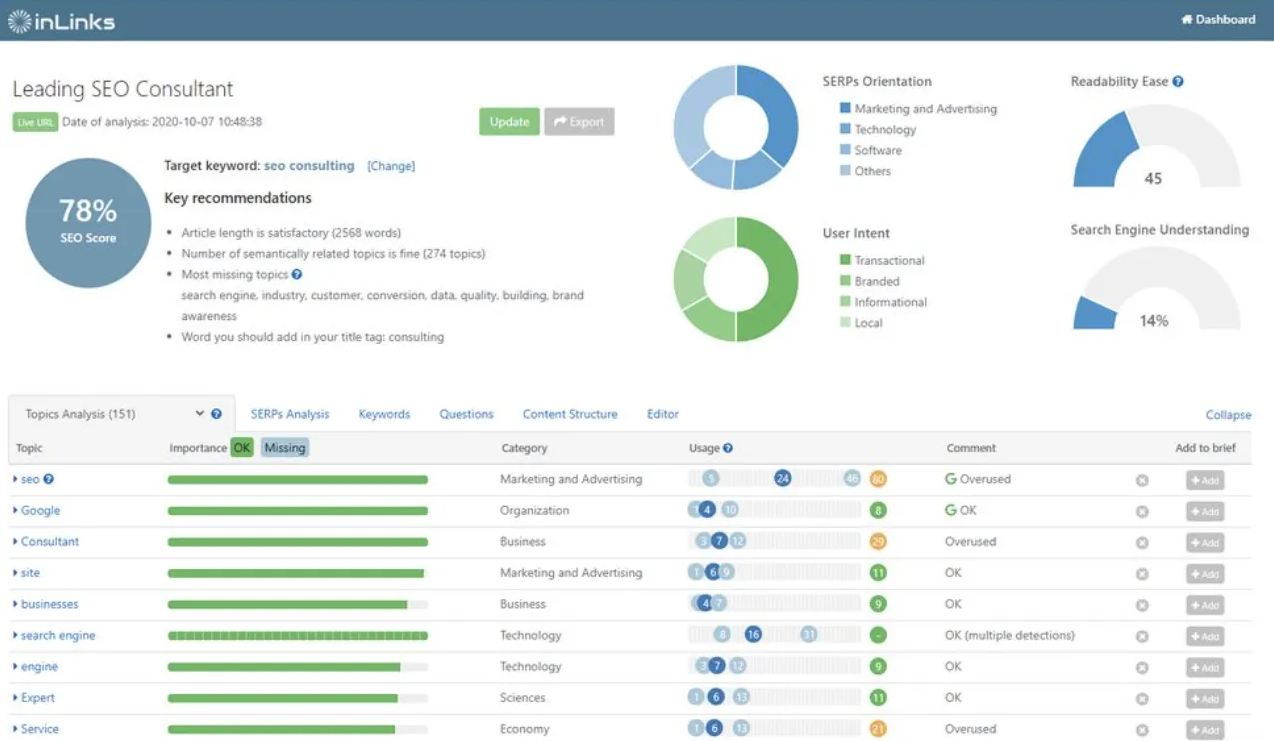
InLinks provides you with a roadmap to content excellence, ensuring your content is not only optimized for search engines but also resonates with your target audience, ultimately driving organic traffic and establishing your brand as a thought leader in your industry.
10. BrandWell
Finally, my favorite tool — BrandWell. For those who are not familiar with my story, this is the tool that turned me from being “the anti-AI writer” into an AI believer and advocate.
We built BrandWell because we needed a better solution to find low-quality content, fix it, and improve content quality quickly across a wide variety of sites and content types. You’ve got to understand topic modeling and your topical authority before your optimization can truly make an impact. BrandWell is good at this, and it might help if you’ve got enterprise-level pricing to work with.
First, let’s talk about topic authority. While many SEO content optimization tools focus on single keywords, BrandWell digs deeper, analyzing your client’s website content, identifying low-quality pieces, and providing data-driven recommendations to optimize for what I call “topic authority.”
If you’ve watched the video I shared earlier, you already have an idea of how BrandWell crawls a website, builds a comprehensive brand graph, and learns about what your client has published – plus what’s missing – so you can help them branch out into deeper authoritative topics.
During a website audit, BrandWell connects to Google Search Console and then finds articles to update and rewrite – which it can do for you at the click of a button!
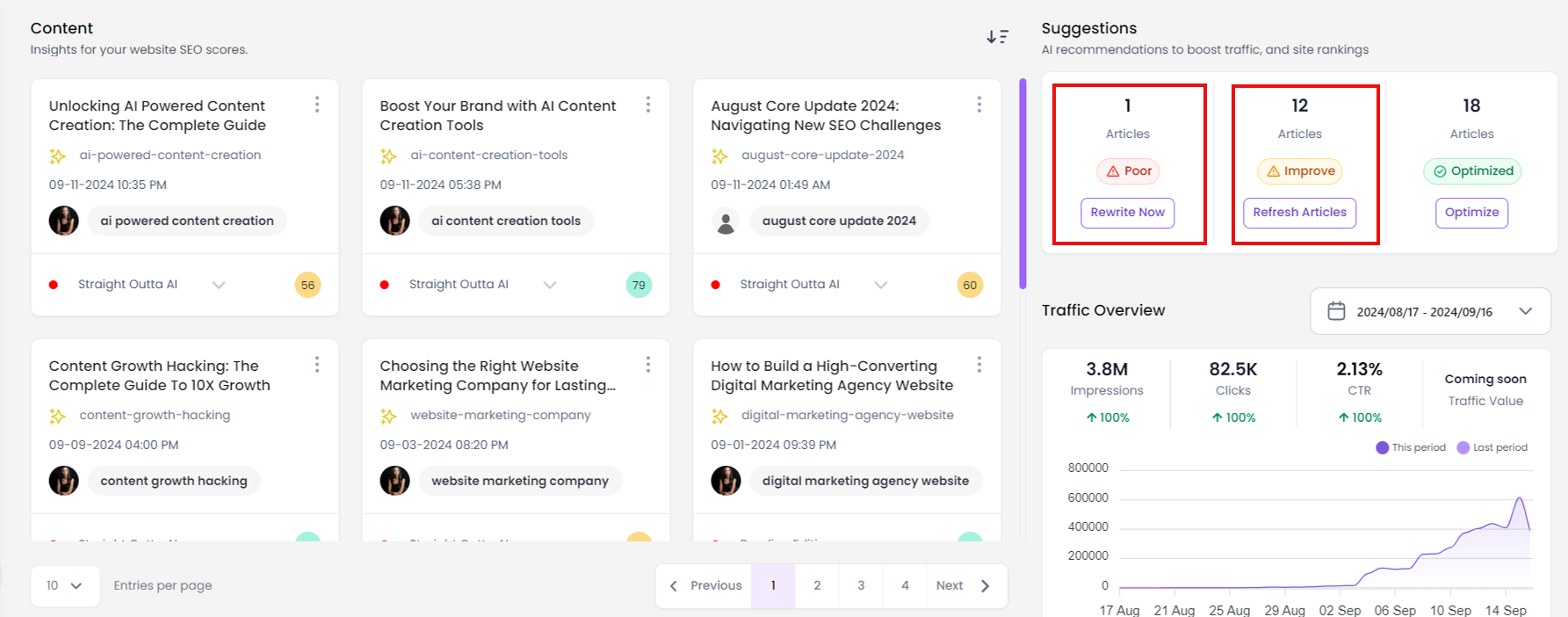
Looking to create new content? Whether you need to conduct in-depth keyword research, develop a content strategy, or optimize content for better search engine rankings, BrandWell has the tools to help you succeed.
One of the key features of BrandWell is its ability to uncover relevant keyword clusters and analyze their metrics. By understanding the search intent behind specific keywords, you can create highly targeted content that resonates with your audience and ranks well in search results.
At the core of BrandWell is a powerful AI content writer that can quickly generate high-quality drafts for both long-form and short-form content. With a single subscription, you gain access to RankWell – the long-form SEO writer with a full suite of content intelligence tools – and WriteWell, the all-around AI writing assistant trained to craft compelling marketing materials in 30+ formats such as persuasive sales emails, product descriptions, YouTube video scripts, LinkedIn posts, and more.
This 3,700-word article was written by RankWell in just 5 minutes:
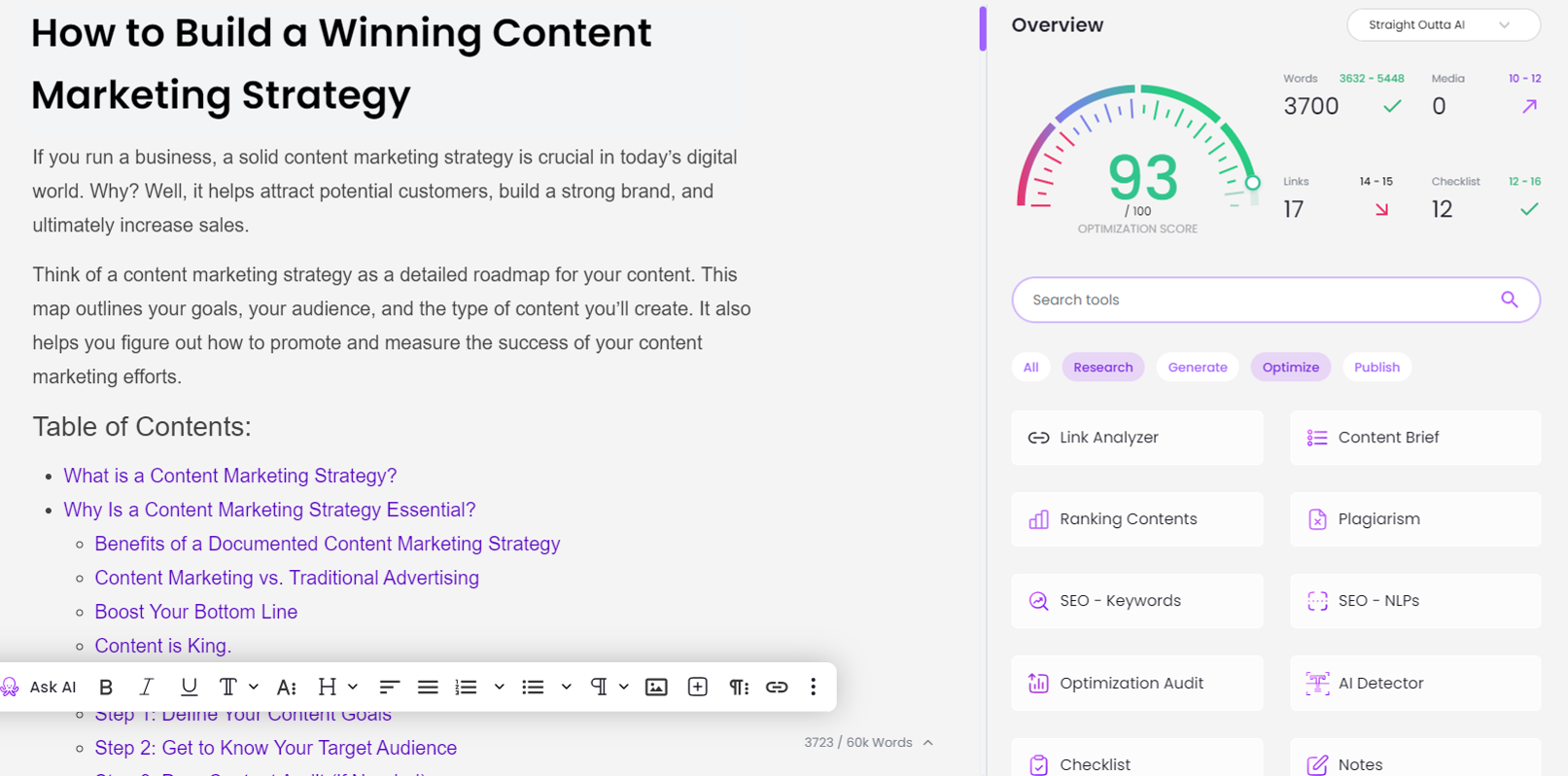
And here’s a LinkedIn post written by the WriteWell AI Agent I personally trained for creating LinkedIn stories:
Want to see how BrandWell can help you create a full ebook? Watch this:
Here are some of the standout features that make BrandWell a powerful content optimization solution:
- Keyword research, topic clustering, content briefs, topic reports
- Content planner and calendar
- Premium, humanlike, long-form blog post generator
- Natural backlink acquisition
- Tone and grammar checker
- Entity analysis, NLP, and salience scoring
- Content optimization audits
- Advanced plagiarism checker and AI detection
- WordPress and Shopify plugins
- AIMEE chatbot
- 30+ AI agents
BrandWell’s unified text editor and user-friendly design make it a joy to use, even for those who aren’t tech-savvy. But what really sets BrandWell apart is its ability to provide personalized, actionable feedback on your content. The AI-powered analysis is incredibly thorough, offering suggestions on everything from tone and style to grammar and syntax.
Now, no tool is perfect. And as much as I love BrandWell, I wish it had more advanced features for keyword research, image optimization, and performance tracking. While it does offer some basic keyword research and optimization tools, I’ve found myself needing to supplement with other tools to get the job done.
As someone who’s built a career in creating high-performing content, I can confidently say that BrandWell is a game-changer for agencies looking to drive real results through content.
Should You Use a Content Optimization Tool?
As an agency owner and content marketer, I’ve seen firsthand how the right tools can make or break your content strategy. And when it comes to ranking higher in search engine results pages, content optimization is non-negotiable.
But with so many tools available, it’s natural to wonder: do you really need one?
The short answer is yes. Content optimization tools act as a trusted virtual assistant that helps you create high-quality content 24/7 – content that not only ranks well but also resonates with your target audience, ultimately driving more organic traffic and leads to your website.
These tools take the guesswork out of content creation, providing actionable recommendations to improve your search engine optimization (SEO) and overall content marketing strategy.
FAQs: Content Optimization Tool
What is the difference between content optimization and SEO?
Content optimization focuses on refining content to better engage and resonate with target audiences, while SEO (Search Engine Optimization) specifically aims to improve a website’s visibility and ranking in search engine results pages (SERPs) through keyword research, link building, and other technical optimizations. While content optimization is a key aspect of SEO, they are not interchangeable terms.
How do you optimize content?
You can optimize content by conducting keyword research, creating high-quality and engaging content, and refining it through on-page optimization, formatting, and analysis, while also promoting it through social media, email marketing, and influencer outreach. By following these steps, you can improve content visibility, engagement, and conversion rates.
Conclusion
The right content optimization tools can make all the difference between ranking on Page One and getting lost in the noise. Each tool I have shared brings its own strengths, whether it’s keyword insights, content grading, or competitor analysis. But imagine having all of that power in one place.
With BrandWell, you get an all-in-one solution that takes the guesswork out of creating content that ranks. From AI-driven topic research to real-time optimization, BrandWell helps you craft content that not only engages your audience but also climbs the search rankings.
Ready to take your content to the next level? Try BrandWell today and start creating content that truly performs.

